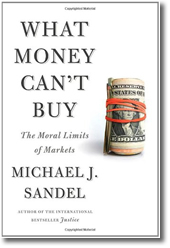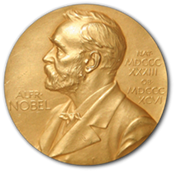
Sandel, Michael J. What money can’t buy : the moral limits of markets. Farrar, Straus and Giroux, 2012.
In January, I reviewed Scott Carney’s engaging book, The Red Market, about the business of organ procurement, a system where economic markets are used to supply bodies and their parts. Carney showed that as a result, human organs have become commodities, bought and sold every day. In the end, he concluded that the market is not the best way to allocate health.
In What Money Can’t Buy, Harvard’s Michael Sandel broadens the discussion of markets and morals to consider the ethics of allocating all sorts of social goods, including education, environmental protection, procreation and more, based on ability to pay.
A faculty member in Government at Harvard, Sandel begins his argument by stating that since the 1980’s economic markets and market values have expanded into broad areas of life. MDs in large cities charge a retainer for premium access to a doctor. Elite universities admit the children of donors, who otherwise would be denied. Lobbyists in Washington pay homeless people to reserve their place in line for congressional hearings. A North Carolina charity pays drug addicted women to be sterilized. Inuit Canadians sell the right to shoot endangered walrus. Children routinely are paid to get good grades. The market has become so pervasive that Americans do not notice it.
Sandel argues that using the market to allocate social and civic goods is unhealthy. Since the mid-90’s, the distribution of wealth in the U.S. has been widening, with the gap between the rich/poor growing ever larger. In an economy where social goods are for sale, those with modest resources are disadvantaged in health, education and political representation, and children are denied equal opportunity. In addition, commercial markets change values. Common values such as citizenship and environmental protection are downgraded when turned into commodities. For example, everyone should treat the environment responsibly, but using carbon offsets to reduce greenhouse gasses may evolve into a means of avoiding the changes in everyone’s behavior that are necessary to address the climate problem. Sandel concludes that markets allocate goods, but they also express values toward the products exchanged. Injecting the market into every transaction changes fundamental values worth caring about.
This thought-provoking book ends with a question “Do we want a society where everything is up for sale? Or are there certain moral and civic goods that markets do not honor and money cannot buy.” Recommended.
Also available as an audiobook.
© Reviewer: Meg Trauner & Ford Library – Fuqua School of Business.
All rights reserved.








